9 start with B start with B
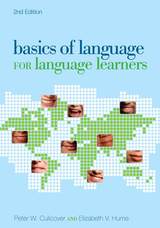
Learning a language involves so much more than just rote memorization of rules. Basics of Language for Language Learners, 2nd edition, by Peter W. Culicover and Elizabeth V. Hume, systematically explores all the aspects of language central to second language learning: the sounds of language, the different grammatical structures, the social functions of communication, and the psychology of language learning and use.
Unlike books specific to one single language, Basics of Language will help students of all languages. Readers will gain insight into the structure and use of their own language and will therefore see more clearly how the language they are learning differs from their first language. Language instructors will find the approach provocative, and the book will stimulate many new and effective ideas for teaching. Both a textbook and a reference work, Basics of Language will enhance the learning experience for anyone taking a foreign language course as well as the do-it-yourself learner.
A new section, “Tools and Strategies for Language Learning,” has been added to this second edition. It comprises three chapters that focus on brain training, memory and using a dictionary. In addition, the section “Thinking Like a Native Speaker” has been substantially updated to include more discussion of errors made by language learners.
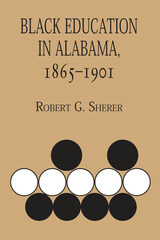
The study of education in Alabama is especially important in understanding black education throughout the United States since the most famous black school, Booker T. Washington's Tuskegee Institute, is located in Alabama and began as a state teachers’ training school. A history of black education in Alabama provides a test case of the frequently assumed dominance of Booker T. Washington and his plan of "industrial'' or vocational training in black education.
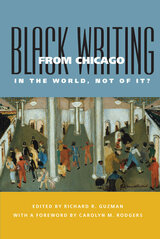
Black Writing from Chicago: In the World, Not of It? takes readers on a cultural trip through Chicago’s literary history. Editor Richard R. Guzman compiles the first comprehensive collection of the works of Chicago’s black writers from 1861 to the present day. The anthology, which includes works from newspaper writing, poetry, fiction, drama, essays, and historical and social commentary, seeks not only to represent a broad range of writings but also to focus tightly on such themes as hope and despair, racism and equality, spirituality and religion. More than sixty writers, from the anonymous “J. W. M. (Colored)” to Ken Green, unfold a story that reflects the literary periods in black American history. Each author’s selection is preceded by a biographical and a bibliographical introduction. Readers interested in Chicago, race relations, and literature, as well as scholars of history, sociology, urban studies, and cultural studies, will find the collection invaluable.

Brave New Digital Classroom deftly interweaves results of pedagogical research and descriptions of the most successful computer-assisted language learning (CALL) projects to explore how technology can best be employed in the foreign-language curriculum to assist the second language acquisition process.
Directed to all language teachers—whether at the school or the postsecondary level, with or without prior experience—this book focuses on how to use new technologies effectively. Blake urges teachers to move beyond a simple functional competence of knowing how to use the tools toward first a critical competence—realizing what the various tools are good for—and ultimately a rhetorical competence of knowing how the tools will help transform the learning environment. This book examines the effective use of a range of technologies, from Internet sites through computer-mediated communication such as synchronous chatting and blogs, to distance learning. At the end of each chapter questions and activities demonstrate the interactionist, learner-centered pedagogy Blake espouses.
An invaluable reference for experienced researchers and CALL developers as well as those of limited experience, Brave New Digital Classroom is also ideal for graduate-level courses on second language pedagogy. It will also be of interest to department chairs and administrators seeking to develop and evaluate their own CALL programs.
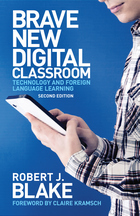
Brave New Digital Classroom examines the most effective ways to utilize technology in language learning. The author deftly interweaves the latest results of pedagogical research with descriptions of the most successful computer-assisted language learning (CALL) projects to show how to implement technology in the foreign language curriculum to assist the second language acquisition process.
This fully updated second edition includes new chapters on the latest electronic resources, including gaming and social media, and discusses the realities and potential of distance learning for second language acquisition. The author examines the web, CALL applications, and computer-mediated communication (CMC), and suggests how the new technologically assisted curriculum will work for the foreign-language curriculum. Rather than advocating new technologies as a replacement for activities that can be done equally well with traditional processes, the author envisions a radical change as teachers rethink their strategies and develop their competence in the effective use of technology in language teaching and learning.
Directed at all language teachers, from the elementary school to postsecondary levels, the book is ideal for graduate-level courses on second language pedagogy. It also serves as an invaluable reference for experienced researchers, CALL developers, department chairs, and administrators.

Robert Blake, now with Gabriel Guillén, updates his successful book (1st ed. 2008, 2nd ed. 2013) on how to teach foreign languages using technology. Brave New Digital Classroom touches on all of the key concepts and challenges of teaching with technology, focusing on issues specific to FLL or L2 learning and CALL. Originally referred to as computer-assisted language learning, CALL has come to encompass any kind of learning that uses digital tools for language learning.
This edition reframes the conversation to account for how technology has been integrated into our lives. Blake and Guillén address the ways technology can help with L2, how to choose the right digital tools, how to use those tools effectively, and how technology can impact literacy and identity. The book is primed for use in graduate courses: terminology is in bold and a comprehensive glossary is included; each chapter finishes with a short list of references for further reading on the topic and discussion questions. The authors provide short interview videos (free via GUP website) to enhance discussions on each chapter’s topic.


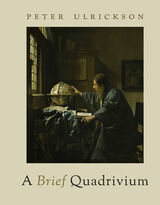
READERS
Browse our collection.
PUBLISHERS
See BiblioVault's publisher services.
STUDENT SERVICES
Files for college accessibility offices.
UChicago Accessibility Resources
home | accessibility | search | about | contact us
BiblioVault ® 2001 - 2024
The University of Chicago Press









